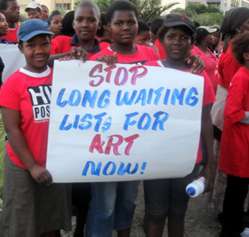IAS
2009 Opening Session Emphasizes Need for Expanded Treatment of HIV and Tuberculosis
in Developing Countries
 | Activists
and researchers alike emphasized the need for greater access to antiretroviral
therapy in developing countries this week at the 5th International AIDS Society
Conference on HIV Pathogenesis, Treatment, and Prevention in Cape Town, South
Africa. |
By
Liz Highleyman  Leading
up to the conference, the Treatment Action Campaign (TAC), which has pioneered
treatment activism in the developing world, organized a march from Cape Town's
District 6 -- a neigborhood infamous for the forced removal of 60,000 black and
colored people during the apartheid era -- to the city's downtown convention center. Leading
up to the conference, the Treatment Action Campaign (TAC), which has pioneered
treatment activism in the developing world, organized a march from Cape Town's
District 6 -- a neigborhood infamous for the forced removal of 60,000 black and
colored people during the apartheid era -- to the city's downtown convention center.
"Mandela's
legacy is health, freedom, and dignity," said TAC General Secretary Vuyiseka
Dubula, who both spoke at the rally and gave the community welcome at the conference's
opening session. "Health is not in a recession. Any cut backs or slowing
down [in funding] would be disaster for people on antiretroviral
therapy." At
a time when wealthy countries are considering adopting a higher CD4 cell threshold
for starting treatment, activists urged the World Health Organization (WHO) to
raise its threshold for resource-limited settings from 200 to 350 cells/mm3. Additional
demands included replacing older toxic drugs like stavudine
(d4T; Zerit) with the modern choices used in the U.S. and Europe, as well
as access to affordable second- and third-line regimens. The
theme was echoed at the opening plenary Sunday night, which featured South Africa's
Deputy President Kgalema Motlanthe, who spent more than a decade as a political
prisoner under apartheid. "Unless we redouble our efforts to conquer this
disease it will define the 21st century for sub-Saharan Africa," he said.
"It is clear that health outcomes are related to a range of social determinants
including work opportunities, education (especially for women), housing, and clean
water. As a society we need to improve social and economic situation for the poor." According
to conference co-chair Hoosen "Jerry" Coovadia, 1 in 5 people in South
Africa have HIV, and among women age 15 and older, the figure is 1 in 2. "HIV
is the handmaiden of tuberculosis," he emphasized, and South Africa is the
epicenter of
an epidemic of extremely drug-resistant TB (XDR-TB). The
International AIDS Society has urged that the 350 cells/mm3 threshold be universally
adopted, IAS president and conference co-chair Julio Montaner noted. "Developing
countries are stuck in a therapeutic corner," he said, with drug choice based
on cost rather than safety and efficacy. "This was acceptable to jump start
[antiretroviral treatment] programs, but no longer." The
G8 (the leaders of the 8 wealthiest countries) came in for criticism from several
speakers for backtracking on its commitment to expand access to antiretroviral
therapy (ART) by 2010. "We
must hold G8 leaders accountable for their failure to deliver on their promises,"
Montaner said. "The U.S. is the only one to sustain its commitment."
Noting a recent study showing benefits in countries supported by PEPFAR (the President's
Emergency Plan for AIDS Relief, instituted by George Bush) compared with non-PEPFAR
countries, he said, "Let us have more PEPFARS rather than more empty promises." Stephen
Lewis, Professor of Global Health at McMaster University and former United Nations
Special Envoy for AIDS in Africa, spoke with his characteristic passion, urging
scientists to become activists. "No one should underestimate the power and
influence of science when it decides to take a stand," he said. Lewis
castigated funding priorities that have given billions to Wall Street and bank
bailouts while health and human needs are left wanting. He also addressed the
debate about competing health funding allocations in a time of recession. "Money
must be found for every imperative," he said. "It can never be an either/or.
We're talking about human lives, for God's sake, not the phoney parsing of a balance
sheet." He
also decried the "ugly homophobic culture," the epidemic of sexual violence,
and the oppression of women -- "the world's most poisonous curse" --
and their role in perpetuating the HIV/AIDS epidemic. At
a press conference on Monday, the day's plenary speakers took Lewis' activism
exhortation to heart. Reuben Granich, who presented his mathematical
model showing that annual testing and universal ART regardless of CD4 count
could reduce HIV incidence by 95% in 10 years, said he has seen no evidence that
investment in HIV has led to neglect of other areas. "The benefit for people
with HIV is clear, but it also has benefits for the societies, families, and communities
in which they exist," he said. Wafaa
El-Sadr, who presented evidence
of the benefits of starting treatment above the 350 cells/mm3 threshold, noted
that "the vast majority [of people with HIV in the world] are not getting
treatment even at the current threshold." Paula
Akugizibwe of the AIDS and Rights Alliance of Southern Africa compared the amounts
spent on corruption and extravagances -- such as African leaders' expensive cars,
private jets, and lavish birthday parties -- against relatively paltry expenditures
on health. "The real challenge is the longstanding moral crisis that has
failed to prioritize health," she said. "If the right to health is not
granted in legislative frameworks, we don't have a way to hold governments accountable." In
a special session and press conference later in the day, National Institutes of
Allergy and Infectious Diseases Director Anthony Fauci and recently appointed
U.S. Ambassador at Large and Global AIDS Coordinator Eric Goosby discussed U.S.
domestic and global AIDS policy under the Obama administration. With
every bit of data we accumulate, Fauci said, "we move toward the realization
of [the benefits of] starting HAART earlier." He said that PEPFAR would continue,
but without the required emphasis on sexual abstinence of the Bush era. He also
said there is a "clear cut intention on the administration's part" to
remove the
ban on federal funding of needle exchange programs. Fauci
explained that the recent emphasis on larger health systems would not detract
from HIV/AIDS funding, but rather the two are interdependent.  | TAC
March (Photo: Liz Highleyman) |
|
"What
the president understands very well is you can't address diseases in a vacuum,"
he said. "We need a more comprehensive approach rather than focusing on a
specific issue. You get an economy of scale when you put things together. It does
not mean individual elements are going to suffer." With regard to NIAID,
he added, "We are not going to restrict what we study to HIV, but to other
diseases in the context of HIV, like TB and hepatitis...I think it's going to
make it better because people with HIV are also dying of other diseases." 7/21/09 Reference
5th
International AIDS Society Conference on HIV Pathogenesis, Treatment, and Prevention
(IAS 2009). July 19-22, 2009. Cape Town, South Africa.
|